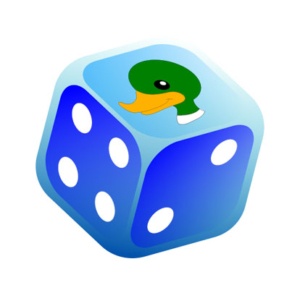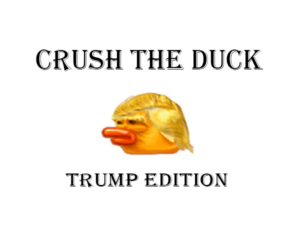Game Synopsis
Crush the Duck – Trump Edition is a satirical political game that was published during the US presidential election in 2020. The object is you hurl meteorites at a Duck that resembles the former US president Donald Trump. If you successfully hit the duck he will disappear, if you miss he laughs at you and you lose. It was released in hopes to influence the voting population.
Research and Development
Research and development for the Crush the Duck started almost 2 years ago, the initial prototype for the game was developed during the App Jam that was part of the second learning block of my master degree. When I first released the prototype I thought to myself, “this duck character really reminds me of someone, the US president! I was not a fan of the administration so I thought it would be a good political statement to release the game under that context. As that learning block continued Crush the Duck was put on hold as development of another project took priority. Jumping back to the present, the US presidential election was underway and I thought this would be a perfect time to re-release Crush the Duck with a design that left nothing to the imagination. I quickly published the prototype on Itch.io and created a post on my Original Games Facebook page.
The “Crush the Duck – Trump Edition” was a small success, the post had a good amount of organic reach, meaning that it was spread to a good number of people without any paid advertising. It also had plenty of engagement, to be exact 72% of my audience engaged with the post. The aspects of engagement include people sharing the post, liking the post and most likely giving the game a try. My thought is that this is the most important quality, without engagement the number of people you reach is meaningless. With this initial boost of engagement I thought it would be smart to make an ad for the game and reach more people. I made a quick ad, sent it off for review and, unfortunately, it was declined! The reason being it involved the name of a politician and could possibly influence the voting population. This made me realize the political power an influential game could have. I began researching more on the history of political video games.
“Video games have a strange and sundry history with politics. Many games grafted visuals of themes onto existing procedural mechanics” -Bogost pg 89 [1]
Ian Bogost’s book Persuasive Games, has an entire chapter on this subject and goes into great detail. The first political game was released in 1985 by Chris Crawford, the game was called “Balance of Power”.
“In the game, the player uses treaties, negotiation, international espionage and as a last resort, military force to manage a world in the throes of a cold war” -Bogost pg 101 [2]
This trend of political games is used widely now a great example of a political that was referred to me by one of my colleagues in my Masters course was the “Brexit Bus” [3] game. I have posted the web link below in my citations if you would like to try the game. This game wonderfully illustrates the fiscal history of Brexit. Although the game mechanics are nothing more than a simple hill climber game, the idea to use a chronological graph as the ground is genius. A great example of an influential political game that uses visual rhetoric to argue a point.
As I move forward with Original Games I plan to continue to emphasize the topical aspects of design and make games with purpose. I feel this strategy will increase the amount of engagement my games receive greatly.
Playtest Reviews
“I tried this game when it was first published and thought it was cute. This Trump Edition is brilliant! I know the mechanics of the game are the same but that resemblance makes the game just that much more awesome.”
“This game is too real! He laughs at you if you fail to ‘crush’ him, haha!”
“I reckon this game is up there on Biden’s top 10 game picks :wink:”
“Good ol’ Uncle Dave tried out this game and he gave it thumbs up! He is a hard-to-amuse man and you did it, Original Games :thumbs up:”
“Great game, super fun, my only complaint is it needs a bigger boulder or maybe add different objects to throw like a cheeseburger or a truck.”
Citations:
[1, 2] Bogost, I. (2010). Persuasive Games: The Expressive Power of Videogames (The MIT Press). The MIT Press.
[3] Brexit Bus. (n.d.). Advisa. https://advisa.se/en/research/brexit-bus/





